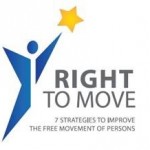EU Rights Clinic and ECAS launch Right to Move Campaign
 The EU Rights Clinic and ECAS have launched the Right to Move campaign, which consists in advocating for seven strategies to improve the free movement of persons in the EU.
The EU Rights Clinic and ECAS have launched the Right to Move campaign, which consists in advocating for seven strategies to improve the free movement of persons in the EU.
The free movement of persons is one of the cornerstones of the EU’s Single Market and is a right deeply cherished by citizens in Europe today.
This campaign is a response to the recent and unprecedented calls made by several governments for imposing further restrictions on the free movement of people based on unsubstantiated claims about the impact of the EU rules.
In order to counter these accusations, we believe that it is important to seize the initiative and propose measures aimed at ensuring that the free movement rules can work better for all EU citizens.
We are therefore launching the Right to Move campaign based on seven strategies to improve the free movement of persons in the EU:
- Directive 2004/38 should be recast into a Regulation
This would reduce divergence in administrative formalities in the EU and further facilitate the exercise of the right of free movement by EU citizens and their family members. Click here for our first strategy paper.
- The Commission’s powers of investigation should be strengthened
The Commission needs to have a full range of measures at its disposal to investigate and enforce the free movement rules more efficiently and fulfil its mission as Guardian of the EU Treaties. Read the second strategy paper.
- Member states should collate better statistics on the free movement of persons
The collection of data on the free movement of EU citizens and their family members would encourage better evidence-based policy-making by the Member States as well as the EU. Find out more about this strategy paper.
- Member states should deepen their collaboration on the free movement of persons
Member States can only develop appropriate and effective responses to challenges generated by the free movement of persons through cooperation guided by independent expertise. Click here for the strategy paper.
- Civil society organisations should be empowered to help citizens overcome obstacles
Empowering civil society groups to inform and assist mobile citizens will ensure that these citizens can make effective use of those rights and overcome obstacles that may come their way. Read more about this strategy here.
- Judgments of the EU Court of Justice prior to 2004 should be translated into all languages
Citizens and their advisers need to be able to rely on the relevant judgments of the EU Court of Justice in all EU official languages irrespective of when the judgment may have been issued. Further details about our proposed sixth strategy can be found here.
- A pro free movement counterfactual should be developed to refute anti-migrant rhetoric
Politicians who believe in the benefits of European integration must learn to present the benefits of free movement using similar tactics and terminology deployed by populist politicians. Click here for the final strategy.
We hope you will endorse the campaign and we thank you in advance for your support.
The views expressed on the blog are personal to the authors and should not be seen as constituting legal advice. It should not be relied upon instead of consulting a lawyer or immigration adviser.
